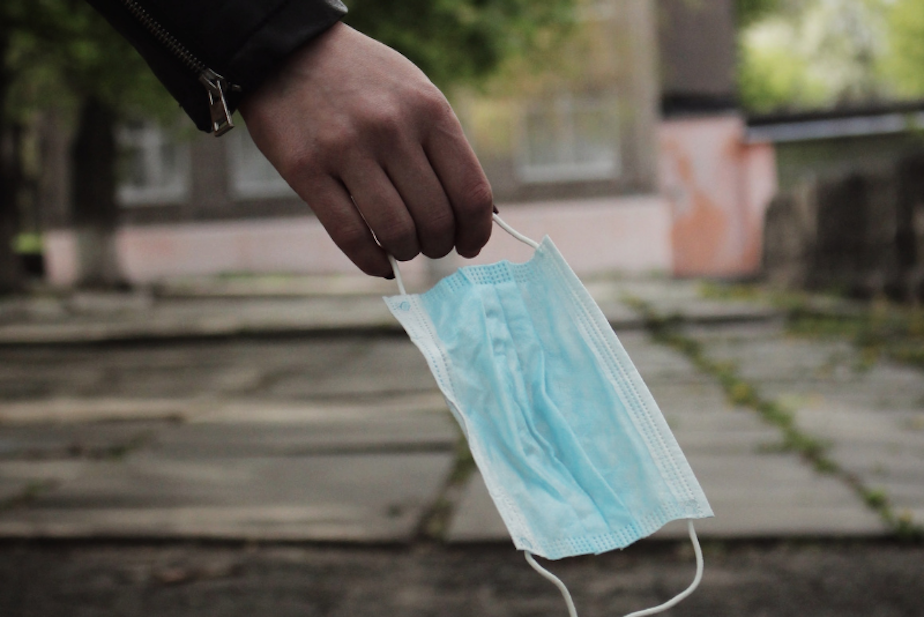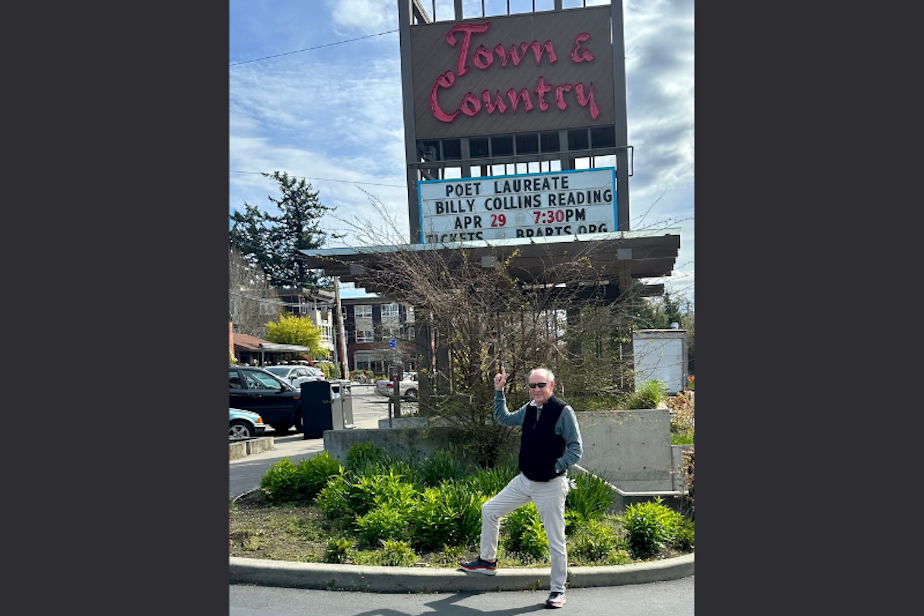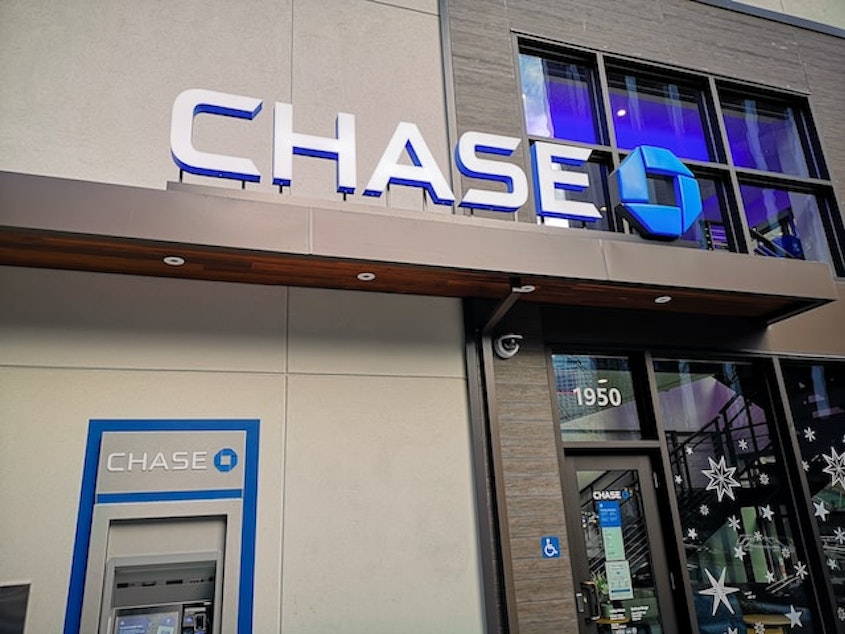Were you 'wrong' during the pandemic?: Today So Far

- Washington Gov. Jay Inslee is not running for re-election next year.
- The next hot topic at Seattle City Hall.
- Were you "wrong" during pandemic times?
This post originally appeared in KUOW's Today So Far newsletter for May 1, 2023.
Nina and I emerged from our car with facemasks firmly worn, plastic gloves on our hands, and hand sanitizer clipped to our belts. We were visiting a couple relatives and it was early on in the pandemic. People were still largely isolating.
At least, they were in the city. Out in suburban Washington, you'd never know a pandemic was going on at the time. Still, Nina and I took a walk with family, wearing masks and gloves. Looking back, it's easy to say that we were going way overboard. I probably should be embarrassed by that scene, but I'm not. We were leaning into the "better safe and embarrassed than infected" perspective. We didn't know that being outdoors would eventually be deemed the safe way to go. Then again, nobody knew at the time that being outdoors was more or less safe. Eventually, somebody was going to be able to say they were "right."
Were they? Were they "right"?
I would argue: Not really. It was a gamble. No matter what anybody tells you today, for a once-in-a-century pandemic, no average person really knew the best way to handle everything. For a time there, we could only make safe bets. That sort of mental calculation around your own situation and safety was what the pandemic evolved to be.
Bill Radke considered all this in a "Words in Review" segment, "Were you 'wrong'?"
Sponsored
I could go back and consider how people were told to wear masks, then not, then encouraged to make masks, then told that homemade materials weren't good enough. I could remember how people were told that being outdoors, away from crowds, was the safest thing to do, and then told to not go fishing. But again, let's be honest and empathetic — aside from a medical expert, nobody was set up to best handle the situation. And to be clear, by medical expert, I mean a doctor, and not people on YouTube or social media. I mean people like University of Washington infectious disease researcher Dr. Helen Chu.
“I think the word ‘wrong’ is not the right phrase to use,” Dr. Chu told Radke. “We had to use the information that we had at the time."
A similar conversation came up in an NPR interview with Philip Zelikow. He works with the nonpartisan Covid Crisis Group, which developed a report around policies and decisions made during the pandemic. There's a lot in the report, but Zelikow notes the USA was largely prepared. It had the science, and it had the money. But there were other issues.
"I mean, this is really a crisis of competence. It's not a crisis of science. It's not a crisis of unwillingness to spend money. It's not a crisis in the sense that, 'Gosh, no one had ever heard of a pandemic danger.' There were great movies and books about it, so people knew about the danger. They had science. They were willing to spend money. The failure was in knowing what to do and how to do it and then getting ready to do it."
We had what we needed to know. Perhaps what we didn't need was division, and ire, and a lack of understanding. That's sort of where Radke took his segment, speaking with author Mónica Guzmán whose book, "I Never Thought of It That Way: How To Have Fearlessly Curious Conversations In Dangerously Divided Times," addresses this issue that persists in our daily lives. Check out the full discussion here.
Sponsored
Speaking of division, get ready for the next hot topic at Seattle City Hall.
A new proposal would outlaw public drug use in Seattle. It comes after state lawmakers failed to come up with a statewide law to address this. Local jurisdictions have quickly come up with their own rules in the absence of a state-level action.
Seattle Councilmembers Sara Nelson and Alex Pedersen, along with City Attorney Add Davison, recently held a media event unveiling their plan. Public drug use in Seattle would become a misdemeanor under the proposal. Nelson and Pedersen are only two out of nine council members, however. There's also the mayor to consider. Almost as quickly as the proposal was announced, other city leaders said they wouldn't support it.
Councilmember Lisa Herbold plainly said she wouldn't vote for it because she has hope that state lawmakers will eventually pass a solution. Mayor Bruce Harrell said that public drug use is "never acceptable," followed by sentiments that brought up the war on drugs, ultimately giving the impression he is hesitant to support this idea.
Other cities around Washington state are not so hesitant and many have already passed their own laws, or are in the process of doing so. Read the full story here.
Sponsored
The next hot topic at the state level will be answering a big question: Who will run for governor in 2024? Only part of that answer is known right now — Gov. Jay Inslee will not run for re-election.
Inslee announced this morning that, after serving a rare third term, he will not seek a fourth term in office. He said he is "ready to pass the torch." This opens the gubernatorial race to a new Democratic contender for the first time in more than a decade, and there have already been a few names rumored to be eying the job. Read the full story here.
AS SEEN ON KUOW

For many, many years, famed poet Billy Collins has often been found strolling around Bainbridge Island. Yet, he is not a Bainbridge Island resident. In fact, he lives in Florida. Why does he frequent this Seattle suburban island so much? He explains why, here. (Courtesy of Billy Collins)
Sponsored
DID YOU KNOW?
Washington state has an official dance. Yep. It has an official insect, bird, fish, song, and folk song. So why not an official dance?
In 1979, state lawmakers voted in favor of making the square dance the official dance of Washington. So it's on the books. The main argument was that Washingtonians are a bunch of squares, so it's therefore in the name. OK, not really. The dance is rooted in a form called a "quadrille," which is French for "square," and was popular among pioneers.
I understand the historical context, but ... square dancing? No offense to square dance fans. It's just that a lot of states have it too. In fact, Oregon made square dancing its official state dance two years before Washington did. It's actually the officials dance for more than half of the USA.
I'm sure we could come up with something a little more unique. Personally, I'm a fan of ghost riding the whip, but that will certainly produce far more accidents and injuries than square dancing. So maybe not. The mosh pit would probably get shot down for the same reason, though that would be a good option. If we could come up with a name for that thing hippies do when they hear music — sort of a lazy running man in their socks/sandals, sticking their thumbs out, and shaking their heads — there's plenty of that going on at public concerts.
Sponsored
ALSO ON OUR MINDS

JPMorgan Chase buys troubled First Republic Bank after U.S. government takeover
First Republic is the third — and largest — U.S. lender to fail this year. Yet federal regulators say it is not a sign of wider problems in the banking industry.

